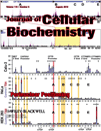
Cell Division
metrics 2024
Illuminating the pathways of cellular processes.
Introduction
Cell Division, an esteemed journal published by BMC, serves as a critical platform for researchers in the fields of biochemistry, cell biology, and molecular biology, showcasing groundbreaking studies and novel insights in the mechanisms governing cell division. Since its establishment in 2006, this Open Access journal, based in the United Kingdom, has strived to promote rigorous scientific discourse, ensuring unrestricted access to its rich content. With a commendable impact factor reflected in its Q1 and Q2 categorizations across various biological disciplines, Cell Division is recognized for its influence and relevance in the academic community. Targeting professionals, researchers, and students alike, it aims to disseminate high-quality research findings that further our understanding of cellular processes and contribute to advances in medical and biotechnological applications. Engage with leading-edge research and broaden your knowledge base in cell biology through this dynamic publication that continues to evolve through 2024 and beyond.
Metrics 2024
 -
- 2.80
2.80 3.10
3.10 -
-Metrics History
Rank 2024
IF (Web Of Science)
JCI (Web Of Science)
Quartile History
Similar Journals

CELLULAR & MOLECULAR BIOLOGY LETTERS
Connecting Ideas, Inspiring Innovations in Molecular BiologyCELLULAR & MOLECULAR BIOLOGY LETTERS, published by BMC, is a premier open-access journal dedicated to disseminating high-quality research in the fields of Biochemistry, Cell Biology, and Molecular Biology. Established in 1996, the journal has emerged as a leader in its domain, boasting an impressive Q1 ranking across three critical categories as of 2023, reflecting its significant impact within the scientific community. With an ISSN of 1425-8153 and an E-ISSN of 1689-1392, it offers accessible research findings to a global audience, having been open access since 2013. Situated in the United Kingdom, at CAMPUS, 4 CRINAN ST, LONDON N1 9XW, the journal continues to serve as a vital resource for researchers, professionals, and students, contributing to advancements in the understanding of cellular and molecular processes. By providing a platform for original research, reviews, and short communications, CELLULAR & MOLECULAR BIOLOGY LETTERS plays a crucial role in fostering dialogue and collaboration within the scientific community.

CELL CYCLE
Charting New Territories in Cell Cycle Understanding.CELL CYCLE, an esteemed journal published by Taylor & Francis Inc., stands at the forefront of biological research, focusing on the intricate mechanisms of cell proliferation, molecular biology, and developmental biology. With an ISSN of 1538-4101 and an E-ISSN of 1551-4005, this journal has established its influence in the field with a commendable impact factor reflecting its rigorous peer-review process and high-quality publications. Notably, in 2023, it achieved a Q1 ranking in Medicine (miscellaneous) and a Q2 ranking in both Cell Biology and Developmental Biology, marking its vital role in advancing scientific understanding and innovation. Operating within a converged framework from 2002 to 2024, CELL CYCLE caters to a diverse audience of researchers, professionals, and students eager to explore contemporary findings and emerging trends. The journal's objective is to disseminate groundbreaking research that enhances our understanding of cellular mechanisms, fostering collaboration and innovation. Although not an open-access journal, it remains a premier source for those engaged in cell cycle research, and its contributions have significant implications for fields such as healthcare, biotechnology, and genetics.

Journal of Molecular Cell Biology
Empowering researchers with open access knowledge.The Journal of Molecular Cell Biology, published by Oxford University Press, is a leading platform for groundbreaking research in the fields of cell biology, genetics, and molecular biology. With an impact factor that places it in the Q1 and Q2 quartiles across key academic categories, this journal has become an essential resource for researchers and professionals committed to advancing our understanding of cellular mechanisms and genetic processes. Since becoming Open Access in 2019, it has enhanced the accessibility of high-quality research, fostering collaboration and knowledge sharing within the scientific community. The journal's Scopus rankings reflect its significant impact in the field, particularly in genetics and molecular biology, ranking within the top percentiles. With a convergence of research spanning from 2009 to 2024, the Journal of Molecular Cell Biology remains at the forefront of innovative discoveries and critical discussions, making it a vital resource for students, academics, and industry experts alike.

EMBO JOURNAL
Unraveling the complexities of genetics and immunology.The EMBO JOURNAL, published by Wiley in Germany, is a renowned scientific journal that has been at the forefront of research in the fields of biochemistry, genetics, and molecular biology since its inception in 1982. With an impressive convergence of contributions leading up to 2024, this journal is recognized for its high impact, reflected in its Q1 rankings across multiple categories including Immunology, Molecular Biology, and Neuroscience. It holds a prestigious place in the academic community, standing out with an exemplary Scopus ranking of #3 in General Immunology and Microbiology and #6 in General Neuroscience, making it a critical resource for researchers, professionals, and students alike. The journal aims to publish transformative research that sheds light on the underlying mechanisms of biological processes, thus advancing our understanding of health and disease. While currently not offering open access, the EMBO JOURNAL continues to facilitate a rich exchange of knowledge through its rigorous peer-review process and commitment to excellence.

Cell Death & Disease
Exploring the frontiers of cell biology and therapeutic innovation.Cell Death & Disease, published by SpringerNature, is a premier open-access journal dedicated to disseminating high-quality research on the mechanisms and implications of cell death, disease pathology, and therapeutic responses. Since its inception in 2010, the journal has quickly established itself within the top tier of academic publishing, achieving a notable impact factor and earning Q1 rankings in several critical categories including Cancer Research, Cell Biology, Cellular and Molecular Neuroscience, Immunology, and Medicine (miscellaneous). With its commitment to open access, Cell Death & Disease ensures that groundbreaking research is available to a global audience, fostering collaboration and advancing knowledge across disciplines. Residing at the forefront of crucial scientific discourse, this journal not only attracts submissions from leading researchers but also significantly influences the fields of molecular biology, immunology, and neurology. By bridging the gap between basic science and clinical applications, it provides vital insights for professionals, academicians, and students alike.

Cell Death Discovery
Unraveling the complexities of cell death mechanisms.Cell Death Discovery, published by Springer Nature, is a distinguished open-access journal dedicated to advancing the field of cell death research. Since its inception in 2015, the journal has rapidly established itself as a premier platform for high-quality research, currently holding a remarkable position in the Q1 quartiles across multiple categories, including Cancer Research, Cell Biology, Cellular and Molecular Neuroscience, and Immunology. With an impact factor reflecting its significant contribution to the scientific community, Cell Death Discovery invites submissions that explore the molecular mechanisms of cell death and its implications across various biomedical fields. The journal's open-access model ensures that groundbreaking research is accessible to a global audience, facilitating collaboration and dissemination among researchers, professionals, and students alike. Located in the UK, at CAMPUS, 4 CRINAN ST, LONDON N1 9XW, ENGLAND, the journal continues to support innovative scholarship and foster a deeper understanding of the processes behind cell viability, development, and disease.

NATURE REVIEWS MOLECULAR CELL BIOLOGY
Connecting research and application in the life sciences.NATURE REVIEWS MOLECULAR CELL BIOLOGY, published by NATURE PORTFOLIO, stands as a seminal journal in the fields of cell and molecular biology, with a significant impact factor that underscores its influence and reputation within the scientific community. Established in 2000 and continuing its legacy into 2024, this journal delivers comprehensive reviews that synthesize current knowledge and advancements in molecular and cellular processes. Respected for its high-quality articles, it has maintained a prestigious Q1 ranking in both Cell Biology and Molecular Biology categories as of 2023. With an exceptional Scopus ranking, taking the top position in its category, it attracts a readership of prominent researchers, professionals, and students eager to stay abreast of groundbreaking discoveries and methodologies. Although it does not offer Open Access, subscribers benefit from exclusive access to vital insights that foster innovative research approaches and advancements in the life sciences. The journal’s objective is to bridge the gap between research and application, providing indispensable resources to its audience while contributing to the global conversation on molecular and cellular biology.

BIOCELL
Elevating Scientific Dialogue in Cell BiologyBIOCELL is a distinguished peer-reviewed journal dedicated to the field of Cell Biology, published by TECH SCIENCE PRESS. Since its inception in 1995, the journal has been at the forefront of disseminating innovative research, with converged publication years extending from 1995 to 2013 and from 2015 to 2024. Although it currently holds a Q4 ranking in the Cell Biology category according to the 2023 category quartiles, BIOCELL aims to foster advancements by providing a platform for researchers, professionals, and students to share their findings in biochemistry, genetics, and molecular biology. The journal is available in both print (ISSN: 0327-9545) and digital formats (E-ISSN: 1667-5746) and seeks to attract contributions that enhance scholarly dialogue and understandings of cellular mechanisms and innovations. With a commitment to quality research and critical discourse, BIOCELL plays an important role in nurturing the scientific community within Argentina and beyond, offering vital insights that contribute to the advancement of the life sciences.

JOURNAL OF CELLULAR BIOCHEMISTRY
Elevating Biochemical Insights for Tomorrow's ScienceJournal of Cellular Biochemistry is a premier academic journal dedicated to advancing the field of biochemistry and cellular biology. Published by Wiley, this influential journal has a significant impact factor that underscores its relevance and authority within the scientific community. With its ISSN 0730-2312 and E-ISSN 1097-4644, the journal has been on the frontier of research since its inception in 1982, and is expected to continue publishing cutting-edge studies through 2024. As evidenced by its ranking in the 2023 Scopus Quartiles, it holds a rank of Q2 in Biochemistry and Q3 in both Cell and Molecular Biology, placing it among the top tiers of scientific journals in these disciplines. The Journal of Cellular Biochemistry serves as a vital resource for researchers, professionals, and students alike, providing a platform for the dissemination of innovative ideas and findings that shape our understanding of cellular processes and biochemical pathways. Though it does not currently offer Open Access options, its robust peer-review process ensures that each publication meets the highest academic standards, thus solidifying its esteemed position in the landscape of biochemical research.

GENES TO CELLS
Exploring the Interplay of Genetics and Cell BiologyGENES TO CELLS is a distinguished peer-reviewed journal published by Wiley, offering valuable insights into the intricate world of cell biology and genetics. With an ISSN of 1356-9597 and an E-ISSN of 1365-2443, this journal has been contributing to the academic community since its inception in 1996 and will continue its publishing journey until 2024. Recognized with a category quartile ranking of Q3 in both Cell Biology and Genetics, and Q2 in Medicine (Miscellaneous) as of 2023, it serves as an important platform for disseminating innovative research and reviews in molecular biology and related fields. Although it does not currently offer open access, the journal caters to a diverse readership by providing comprehensive studies that are essential for professionals, researchers, and students aiming to deepen their understanding of genetic mechanisms and cellular functions. Situated in the United Kingdom, GENES TO CELLS continues to play a pivotal role in shaping the future of biological research.